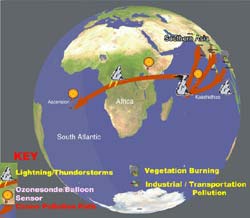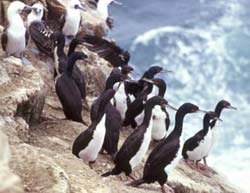University of Leicester scientists have made a unique discovery at an Atlantic island popular with British holidaymakers.
They have uncovered giant sand dunes on Tenerife that tell a tale of terrifying destruction in ancient times, when fiery clouds swept right across the island, leaving very little in their wake.
Volcanic islands – volcanoes whose summits poke out of the oceans – make popular holiday destinations, like Madeira, Hawaii and the Azores. Some, like Hawaii, erupt lava f

NASA scientists discovered pollution could catch an airborne “express train,” or wind current, from Asia all the way to the southern Atlantic Ocean.
Scientists believe during certain seasons, as much as half of the ozone pollution above the Atlantic Ocean may be speeding down a “train” track of air from the Indian Ocean. As it rolls along, it picks up more smog from air peppered with thunderstorms that bring it up from the Earth’s surface.
Bob Chatfield, a scientist at NASA
The Younger Dryas period, about 12 000 years ago, was marked by a sharp cooling event in the Northern Hemisphere. Temperatures there fell by between 2 and 10°C. The East Antarctic in contrast experienced an episode of warming. Data have up to now been insufficient or too inconclusive to enable palaeoclimatologists to track this climatic event in the southern temperate regions and the tropics. An IRD researcher campaign took a 2 m drill core sample from the isle of Espiritu Santo, Vanuatu, found to co
Staying close to mother helps baby dolphins swim – but they can’t keep together when fleeing from fishing boats
Why has the introduction of dolphin-friendly tuna-fishing methods not led to a recovery of dolphin populations? A new study shows how chase by tuna fishermen may sever the link between mother and baby dolphins, to disastrous effect.
Young dolphins keep up with their mothers, who are more powerful swimmers, by adopting the ideal position to get a ’free ride’ in th
Computer security – or the apparent lack of it – is increasingly a worry for network administrators. But viruses and other such vulnerabilities are no mystery for Europe’s Computer Security Incident Response Teams, now also finding their feet in the European Union’s newest Member States.
Creating and managing Computer Security Incident Response Teams (CSIRTs) is just one of the topics at this year’s Computer Security Incident Handling Conference. Organised by FIRST (Forum of

In the late 19th and early 20th centuries, the tens of millions of marine birds living in the “Bird Islands of Peru” became famous around the world. This was due to their appeal as a visual spectacle and because they became economically important as high producers of guano, droppings that the country mined and exported around the world for fertilizer.
A new study published in the current issue of the journal Fisheries Oceanography says the populations of these famous birds have declined dra